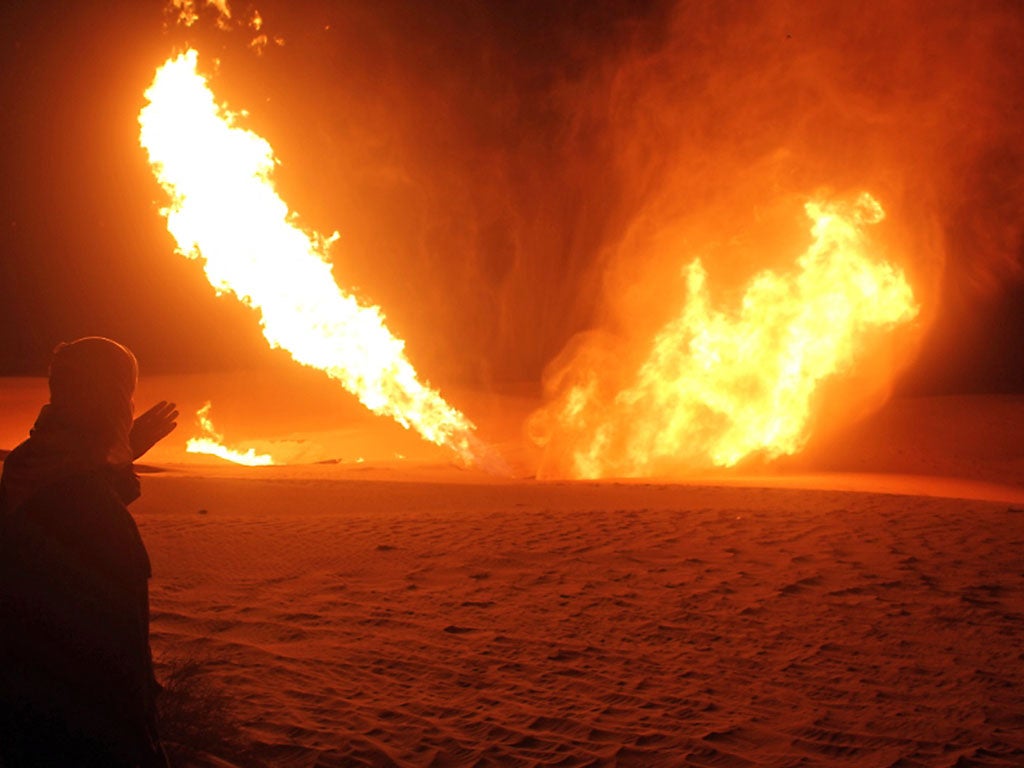Tensions flare as Egypt cuts off gas deal with Israel
Netanyahu tries to play down fraying relations as Cairo scraps Mubarak-era contract

Israeli officials have sought to downplay the political repercussions of Egypt's abrupt decision to cancel a 20-year gas-supply contract over a payment dispute amid deteriorating ties between the two countries.
The gas deal, signed in 2005, has emerged as a focus for public ire in Egypt. Once seen as a vehicle for corruption under Hosni Mubarak, the ousted Egyptian leader, it is now viewed as a hated symbol of the previous regime's close ties with the Jewish state.
Israeli officials initially reacted angrily to the Egyptian decision, calling it a "dangerous precedent" that could endanger the 1979 peace treaty between the two countries. But yesterday, Israel back-pedalled on its criticism of Cairo, painting the dispute as purely commercial in nature.
"We don't see this cut-off of the gas as something that is born out of political developments," the Israeli Prime Minister, Benjamin Netanyahu, said. "It's actually a business dispute between the Israeli company and the Egyptian company."
Mohamed Shoeib, head of the state-owned Egyptian Natural Gas Holding Company, said the deal was cancelled because Israel had not paid for the gas for the past four months. "This has nothing to do with anything outside of the commercial relations," he said.
Israel has rejoined that the gas supply, which at one time accounted for 40 per cent of its needs, has been continuously disrupted in recent months. Unknown saboteurs have blown up the pipeline in the Egyptian Sinai more than 14 times in the past year.
The gas deal, controversial even under Mr Mubarak's rule, has come under intense scrutiny in Egypt since the dictator was toppled from power last year following a popular uprising. His regime, which fostered close ties with Israel despite deep-running resentment among ordinary Egyptians over Israeli policies towards the Palestinians in Gaza and the West Bank, was accused of selling the gas to Israel at below-market prices. Moreover, Mubarak allies were accused of using the deal to enrich themselves, and several officials have faced charges in connection with the contract.
The decision to cancel the deal has been welcomed inside Egypt, with the presidential candidate Amr Moussa arguing that it was a "natural step" given the corruption that tainted the agreement. Others said that Egypt needed the gas amid shortages of its own, although an Egyptian minister said yesterday that Israel was welcome to negotiate a new contract.
As the Israeli premier dispatched officials to Cairo in an effort to contain the crisis, there were some in his government who warned that the Egyptian decision would have far-reaching repercussions. "The pretext is that this is a business dispute, but we see it as not a business dispute," said Uzi Landau, Israel's Energy Minister, warning of power shortages this summer and signalling worse to come. The Finance Minister Yuval Steinitz described it as a "dangerous precedent that diminishes the peace treaty".
Many in Israel fear that the Islamist parties, who now command a majority in Egypt's new parliament, will abrogate the landmark 1979 peace deal that has ensured a stable, if cool, peace along its southern border for three decades. Although the Muslim Brotherhood, the dominant political force in Egypt, has pledged to uphold past agreements with Israel, the peace deal, which was signed without consultation with the Egyptian public, is nevertheless expected to become a focus of debate in coming months.
"What happened with the gas deal serves as a reminder that any kind of relationship with Israel ... is not popular in Egypt," Eli Shaked, an Israeli former ambassador to Egypt, told The Independent. "It's not going to happen in the foreseeable future, but after all the procedures – governmental, presidential [elections] – come to an end, the Israeli file will again be on the table."
Special relationship: Post-spring freeze
* Militants crossed the border and attacked an Israeli bus, killing eight, last August. Five Egyptian soldiers were later killed, presumed to be by Israeli forces pursuing the militants.
* Thousands of rioters stormed Israel's embassy in Cairo in September, forcing the ambassador to flee. Egypt's military rulers were accused of initially ignoring US pleas to intervene for political gain.
* Attackers have blown up the Israel-Egypt gas pipeline more than 14 times since the revolution in Egypt, apparently to stop supplies to Israel. The attacks have further strained relations between Israel and Egypt since the exit of Hosni Mubarak.
Join our commenting forum
Join thought-provoking conversations, follow other Independent readers and see their replies
Comments
Bookmark popover
Removed from bookmarks